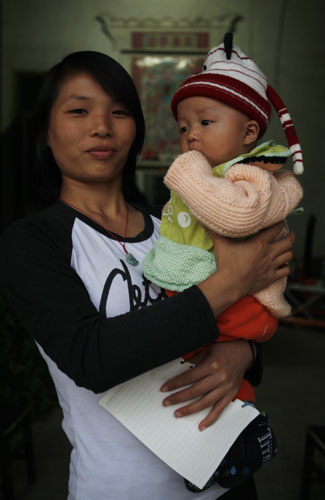'Strangers' return to a frosty village welcome
Independent thinking
 |
|
Zhou Qiuhua, 24, holding her son, plans to get back to work in cities when the boy is 1 year old. |
For Yang, who moved to South China's prosperous Guangdong province at the age of 15, the biggest adjustment after returning to Nanta has come in having to rely on her husband for money.
Although it is traditional for rural men to feed and clothe their families, Yang argues that no woman "between 20 and 40 should have to ask a man for money".
She started her migrant life earning just 300 yuan a month as a storehouse manager for an electronics firm in Zhongshan. When the company went bankrupt in 1997, she found work in a restaurant in Shenzhen, arguably the Pearl River Delta's most successful city and a top destination for the migrant workforce.
"Working in the restaurant was hard," recalled the mother, who quit education before graduating junior middle school. "My job was prepping food for the cooks, but everything was in English so it was mission impossible for me."
She lasted just one week and spent the next two months relying on any temporary work she could find before returning to Zhongshan for a job at a hardware factory.
"By then, I was making more than 1,000 yuan a month and life was getting easier," said Yang, who in her spare time would play games, go skating or visit karaoke bars with friends.
"At weekends, we'd take a 15-minute bus ride to a shop at a nearby clothing market," she said. "When I was in Guangdong, my friends and I always split the bill when we went out. I can't remember where I spent all my money but it was hard to save any."
However, like many returnees, Yang, whose husband runs a small feed business, said she understands that compromise is an important part of resettling in the countryside.
"If I wasn't taking care of the children, I would never depend on a man financially," she added, patting her crying son on the back. "The twins have been my sole source of happiness since I returned home."
China's migrant population reached roughly 201 million in 2008, according to statistics released this year by the National Population and Family Planning Commission. Yet, Meng said many of them, particularly women, are returning to the countryside because of the hukou (permanent residency) system, which strictly separates rural and urban residents.
"Migrant workers feel rejected by the cities' employment, housing, education and social security systems, which make it hard for them to settle where they work," she said. "There's a big gulf between the flow and migration for China's rural population. It may be easy to flow but it's extremely hard to migrate."
Meng's study for the Chinese Academy of Social Sciences concluded that tracing the movement of female migrant workers results in "an M cycle".
"The 'M' shows the two peaks of when rural women flow to the cities," said project leader Meng, who explained the first peak is when women leave their villages at age 17 or 18 and return home to get married or have a child at about 20 or 22.
"Most move away again at 25 - the second peak - and will then return for good at about 35," she added.
Zhou Qiuhua, 24, who lives near Yang in Nanta, fits the model almost perfectly. She returned home last year from Dongguan, another manufacturing hub in Guangdong, to give birth to her son.
"It wasn't a realistic option to have a baby in Dongguan," she said. "I could only have a three-month vacation and nobody there could help me with the delivery or taking care of the baby."
Unlike Yang, however, Zhou plans to go back to the city to work when her son is 12 months old. "I'll come back when he turns 3 and stay with him as he goes to school," she said.
Experts say having a child is the No 1 reason why most women return to their villages. With no social insurance coverage or family to care for them, most rural employees are forced to quit the factories once they get pregnant.
"I think the problem has caught the attention of policymakers and the situation is changing, albeit very slowly," said Meng.
In her team's final report, it reads: "As the barriers gradually collapse and urbanization moves forward, a nationwide integrated social security system will be built and the number of migrant workers returning to the countryside because of (poor) social security will shrink."
 0
0 






